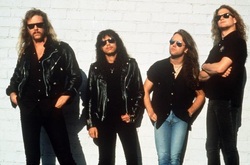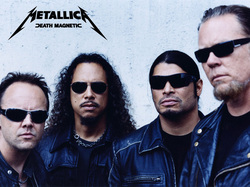Metallica
Metallica (pronounced /məˈtælɨkə/ ( listen)) is an American heavy metal band from Los Angeles, California, formed in 1981.
The band was founded when James Hetfield responded to an advertisement that drummer Lars Ulrich had posted in a local newspaper. The current line-up features long-time lead guitarist Kirk Hammett (who joined the band in 1983) and bassist Robert Trujillo (a member since 2003) alongside Hetfield and Ulrich. Notable previous members of the band include former lead guitarist Dave Mustaine (who later went on to found the band Megadeth) and former bassists Ron McGovney, Cliff Burton and Jason Newsted. The band also had a long collaboration with producer Bob Rock, who produced all of the bands albums between 1990 and 2003 and served as a temporary bassist between the departure of Newsted and the hiring of Trujillo.
Metallica's early releases included fast tempos, instrumentals, and aggressive musicianship that placed them as one of the "big four" of the thrash metal subgenre alongside Slayer, Megadeth, and Anthrax, during the genre's development into a popular style.[1] The band earned a growing fan base in the underground music community and critical acclaim, with the 1986 release Master of Puppets described as one of the most influential and "heavy" thrash metal albums. The band achieved substantial commercial success with their eponymous fifth album (also known as The Black Album), which debuted at number one on the Billboard 200. With this release the band expanded its musical direction resulting in an album that appealed to a more mainstream audience.
In 2000, Metallica was among a number of artists who filed a lawsuit against Napster for sharing the band's copyright-protected material for free without any band member's consent.[2] A settlement was reached, and Napster became a pay-to-use service. Despite reaching number one on the Billboard 200, the release of St. Anger alienated many fans with the exclusion of guitar solos and the "steel-sounding" snare drum. A film titled Some Kind of Monster documented the recording process of St. Anger and the turmoil within the band during that time.
Metallica has released nine studio albums, three live albums, two EPs, 24 music videos, and 45 singles. The band has won nine Grammy Awards, and has had five consecutive albums debut at number one on the Billboard 200,[3] making Metallica the first band to do so; this record was later matched by the Dave Matthews Band.[4] The band's 1991 album, Metallica, has sold over 15 million copies in the United States, and 22 million copies worldwide, which makes it the 25th-best-selling album in the country.[5] In December 2009, it became the best-selling album of the SoundScan era, surpassing 1997's Come On Over by country artist Shania Twain.[6] The band has sold an estimated 100 million records worldwide as of the release of their latest album, Death Magnetic. As of December 2009, Metallica is the fourth best-selling music artist since the SoundScan era began tracking sales on May 25, 1991, selling a total of 52,672,000 albums in the United States alone.[7]
The band was founded when James Hetfield responded to an advertisement that drummer Lars Ulrich had posted in a local newspaper. The current line-up features long-time lead guitarist Kirk Hammett (who joined the band in 1983) and bassist Robert Trujillo (a member since 2003) alongside Hetfield and Ulrich. Notable previous members of the band include former lead guitarist Dave Mustaine (who later went on to found the band Megadeth) and former bassists Ron McGovney, Cliff Burton and Jason Newsted. The band also had a long collaboration with producer Bob Rock, who produced all of the bands albums between 1990 and 2003 and served as a temporary bassist between the departure of Newsted and the hiring of Trujillo.
Metallica's early releases included fast tempos, instrumentals, and aggressive musicianship that placed them as one of the "big four" of the thrash metal subgenre alongside Slayer, Megadeth, and Anthrax, during the genre's development into a popular style.[1] The band earned a growing fan base in the underground music community and critical acclaim, with the 1986 release Master of Puppets described as one of the most influential and "heavy" thrash metal albums. The band achieved substantial commercial success with their eponymous fifth album (also known as The Black Album), which debuted at number one on the Billboard 200. With this release the band expanded its musical direction resulting in an album that appealed to a more mainstream audience.
In 2000, Metallica was among a number of artists who filed a lawsuit against Napster for sharing the band's copyright-protected material for free without any band member's consent.[2] A settlement was reached, and Napster became a pay-to-use service. Despite reaching number one on the Billboard 200, the release of St. Anger alienated many fans with the exclusion of guitar solos and the "steel-sounding" snare drum. A film titled Some Kind of Monster documented the recording process of St. Anger and the turmoil within the band during that time.
Metallica has released nine studio albums, three live albums, two EPs, 24 music videos, and 45 singles. The band has won nine Grammy Awards, and has had five consecutive albums debut at number one on the Billboard 200,[3] making Metallica the first band to do so; this record was later matched by the Dave Matthews Band.[4] The band's 1991 album, Metallica, has sold over 15 million copies in the United States, and 22 million copies worldwide, which makes it the 25th-best-selling album in the country.[5] In December 2009, it became the best-selling album of the SoundScan era, surpassing 1997's Come On Over by country artist Shania Twain.[6] The band has sold an estimated 100 million records worldwide as of the release of their latest album, Death Magnetic. As of December 2009, Metallica is the fourth best-selling music artist since the SoundScan era began tracking sales on May 25, 1991, selling a total of 52,672,000 albums in the United States alone.[7]
History
Metallica was formed in Los Angeles, California, in late 1981 when drummer Lars Ulrich placed an advertisement in a Los Angeles newspaper--The Recycler—which read "Drummer looking for other metal musicians to jam with Tygers of Pan Tang, Diamond Head and Iron Maiden."[8] Guitarists James Hetfield and Hugh Tanner of Leather Charm answered the advertisement. Although he had not formed a band, Ulrich asked Metal Blade Records founder Brian Slagel if he could record a song for the label's upcoming compilation album Metal Massacre. Slagel accepted, and Ulrich recruited Hetfield to sing and play rhythm guitar.[8] The band was officially formed in October 1981, five months after Ulrich and Hetfield first met.[9]
Ulrich talked to his friend Ron Quintana, who was brainstorming names for a fanzine. Quintana had proposed the names MetalMania and Metallica. Ulrich used Metallica for the name of his band. A second advertisement was placed in The Recycler for a position as lead guitarist. Dave Mustaine answered, and, after seeing his expensive guitar equipment, Ulrich and Hetfield recruited him. In early 1982, Metallica recorded its first original song "Hit the Lights" for the Metal Massacre I compilation. Hetfield played bass on the song and Lloyd Grant was credited with a guitar solo.[8] Released on June 14, 1982, early pressings of Metal Massacre I listed the band incorrectly as "Mettallica". Although angered by the error, Metallica managed to create enough "buzz" with the song and the band played its first live performance on March 14, 1982 at Radio City in Anaheim, California with newly recruited bassist Ron McGovney.[10] Metallica recorded its first demo, Power Metal, a name inspired by Quintana's early business cards in early 1982. In the fall of 1982, Ulrich and Hetfield attended a show at the West Hollywood nightclub Whisky a Go Go which featured bassist Cliff Burton in a band called Trauma. The two were "blown away" by Burton's use of a wah-wah pedal and asked him to join Metallica. Hetfield and Mustaine wanted McGovney out as they thought that he "didn't contribute anything, he just followed."[11] Although Burton initially declined the offer, by the end of the year he accepted on the condition the band move to El Cerrito in the San Francisco Bay Area. Metallica's first live performance with Burton was at the nightclub The Stone in March 1983, and the first recording to feature Burton was the 1983 Megaforce demo.[11]
Metallica was ready to record its debut album, but when Metal Blade was unable to cover the additional cost, the band began looking for other options. Concert promoter Johnny "Z" Zazula, who had heard the 1982 No Life 'til Leather demo, offered to broker a record deal with Metallica and New York City-based record labels. After receiving no interest from various record labels, Zazula borrowed the money to cover the record's recording budget and signed Metallica to his own label, Megaforce Records.
Ulrich talked to his friend Ron Quintana, who was brainstorming names for a fanzine. Quintana had proposed the names MetalMania and Metallica. Ulrich used Metallica for the name of his band. A second advertisement was placed in The Recycler for a position as lead guitarist. Dave Mustaine answered, and, after seeing his expensive guitar equipment, Ulrich and Hetfield recruited him. In early 1982, Metallica recorded its first original song "Hit the Lights" for the Metal Massacre I compilation. Hetfield played bass on the song and Lloyd Grant was credited with a guitar solo.[8] Released on June 14, 1982, early pressings of Metal Massacre I listed the band incorrectly as "Mettallica". Although angered by the error, Metallica managed to create enough "buzz" with the song and the band played its first live performance on March 14, 1982 at Radio City in Anaheim, California with newly recruited bassist Ron McGovney.[10] Metallica recorded its first demo, Power Metal, a name inspired by Quintana's early business cards in early 1982. In the fall of 1982, Ulrich and Hetfield attended a show at the West Hollywood nightclub Whisky a Go Go which featured bassist Cliff Burton in a band called Trauma. The two were "blown away" by Burton's use of a wah-wah pedal and asked him to join Metallica. Hetfield and Mustaine wanted McGovney out as they thought that he "didn't contribute anything, he just followed."[11] Although Burton initially declined the offer, by the end of the year he accepted on the condition the band move to El Cerrito in the San Francisco Bay Area. Metallica's first live performance with Burton was at the nightclub The Stone in March 1983, and the first recording to feature Burton was the 1983 Megaforce demo.[11]
Metallica was ready to record its debut album, but when Metal Blade was unable to cover the additional cost, the band began looking for other options. Concert promoter Johnny "Z" Zazula, who had heard the 1982 No Life 'til Leather demo, offered to broker a record deal with Metallica and New York City-based record labels. After receiving no interest from various record labels, Zazula borrowed the money to cover the record's recording budget and signed Metallica to his own label, Megaforce Records.


